Suspended Animation #287
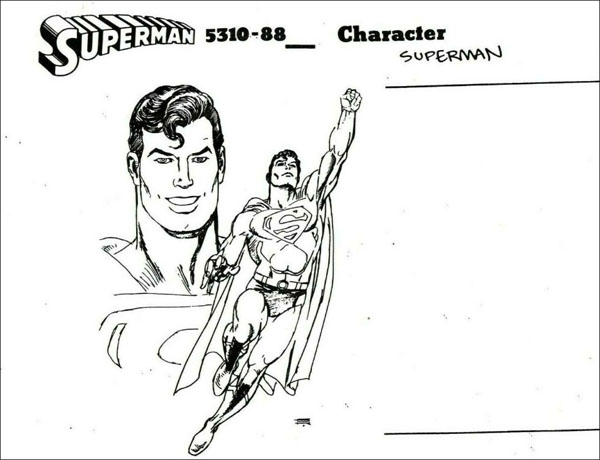
Most of us can talk knowledgeably about the Fleischer/Famous series of Superman theatrical shorts or even Filmation saving Saturday morning with The New Adventures of Superman series in 1966 and the Superman: The Animated Series that debuted from Warners in 1996.
No one seems to talk about the 1988 Saturday morning television series entitled Superman produced by Ruby-Spears that aired on CBS to coincide with the character’s 50th anniversary.
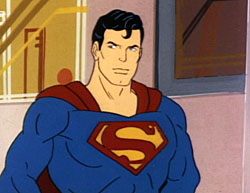 Produced at Ruby-Spears Productions right next door to Hanna-Barbera Studios, and animated in Japan and Korea at Toei Animation and Dai Won Animation, the series’ production team of writers and artists included supervising producer John Dorman, story editor Marv Wolfman (who had written Superman comic book stories in the early 1980s and for the show did the bible and wrote the pilot episode), and production designer Gil Kane.
Produced at Ruby-Spears Productions right next door to Hanna-Barbera Studios, and animated in Japan and Korea at Toei Animation and Dai Won Animation, the series’ production team of writers and artists included supervising producer John Dorman, story editor Marv Wolfman (who had written Superman comic book stories in the early 1980s and for the show did the bible and wrote the pilot episode), and production designer Gil Kane.
In 2013 a hardcover book collecting all 380 some pages of Superman stories drawn by Kane was released. Kane also storyboarded many of the action sequences in the animated series along with Rick Hoberg, Alfredo Alcala, Kurt Conner, and Dick Sebast. Thom Enriquez storyboarded all of the Superman’s Family Album sequences.
As Wolfman recalled for writer Andy Mangels, “Joe (Ruby) called me up out of the blue and asked me if I would like to work on the project. He did not know my connection to Superman. He had only heard that I was good for animation and that I knew the character. I don’t think he was fully aware of all my comic work.”
Joe Ruby said, “John Dorman — he’s a filmmaker and that’s the difference. He made sure the show had all the creative shots, the movement, some of that great left-to-right or down-angle camera moves. The show was well paced, well boarded, and I think John really put these things together well.”
Writers included Marty Pasko (Fugitive from Space), Karen Willson (By the Skin of a Dragon’s Teeth, The Hunger), Buzz Dixon (Cybron Strikes), Michael Reaves (The Big Scoop, The Beast Beneath These Streets), Larry DiTillio (Triple Play, Bonechill), Chris Weber, Meg McLaughlin and the team of Ralph Sanchez and Steve Gerber (The Last Time I Saw Earth).
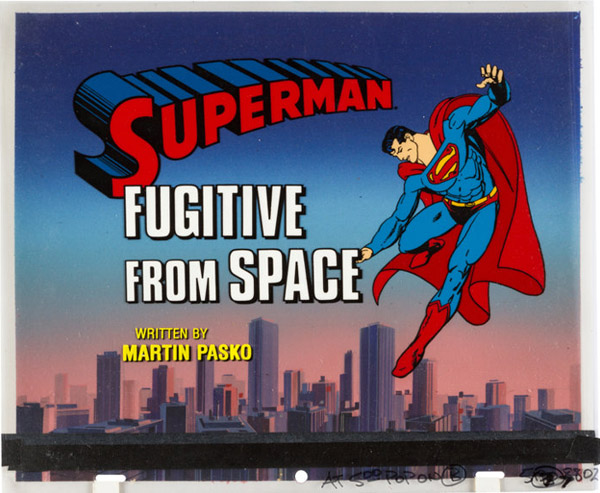
Wolfman and his assistant Cherie Wilkerson (who helped on some scripts) wrote the episode Superman Meets Wonder Woman based on the George Perez version of Wonder Woman. “I think what George is doing with Wonder Woman is remarkable,” said Wolfman who had Superman helping the Amazon Princess with a menace on Paradise Island. The episode was loosely based on the 1984 comic book Wonder Woman #314 in which the sorceress Circe sends a griffin to attack Wonder Woman.
Only thirteen half hour episodes were produced. Each episode featured an eighteen minute story of Superman and a four minute Superman’s Family Album segment of Clark Kent when he was a boy. In this series he was never the costumed Superboy when he was younger but did have powers.
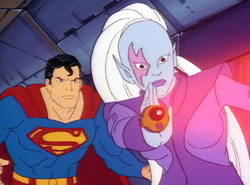 This idea for this segment came from CBS children’s television department head Judy Price. Most of the stories for this segment were written by Cherie Wilkerson. The stories dealt with topics like first day at school, an overnight scouting campout, getting a driver’s license, first date and graduation from high school among other challenges. These episodes feature Lana Lang and the Kents. The final episode has Clark applying for a job at the Daily Planet and wearing the costume.
This idea for this segment came from CBS children’s television department head Judy Price. Most of the stories for this segment were written by Cherie Wilkerson. The stories dealt with topics like first day at school, an overnight scouting campout, getting a driver’s license, first date and graduation from high school among other challenges. These episodes feature Lana Lang and the Kents. The final episode has Clark applying for a job at the Daily Planet and wearing the costume.
The series reflected some of the new concepts introduced in the somewhat recent major major relaunch of the character in DC comic books. For instance, in the comics Wolfman had reimagined Lex Luthor not as an escaped criminal running around in a prison uniform or simply a mad scientist but as a corrupt billionaire industralist and wore a ring with a stone of kryptonite.
Luthor appeared in four episodes and other villains included Cybron (a cyborg from the future); Doctor Morpheus (who strips Superman of his powers); the Hunter (a cunning and adaptable beast created by General Zod to exterminate Superman); The Prankster, Sorceress of Time and the pirate Commander Wildsharkk among others.
The classic characters of Jimmy Olsen, Daily Planet editor Perry White and Lois Lane were prominent and in a nod to the Miss Tessmacher character from the movie Superman (1978) was a new character called Jessica Morganberry who was Luthor’s live-in girlfriend and was a ditzy blonde.
The opening credits used a re-orchestrated version of John Williams classic theme from the Superman movies and the narration from the 1950s television show Adventures of Superman.
Superman/Clark Kent was voiced by Beau Weaver who would later be the voice of Mr. Fantastic in the 1994 Marvel animated series Fantastic Four.
Joe Ruby told writer Brent Frankenhoff, “We went through a lot of different directions in development as to what kind of Superman we wanted. We had several different models — the crying/feeling Superman, the lecturing/do-gooder/save-the-day Superman, then there was the hip Superman, and even the
long-haired Superman. And, of course, there was the old straight-as-an-arrow Superman.
“Ultimately, we settled on the Christopher Reeve model — he had personality and a sense of humor, and yet he was still Superman. We figured that it worked for the films, so it would work well for us.”
Wolfman told Mangels, “Our Superman is the Superman character we’ve all known and loved. Our Superman cast is a combination of several different versions. The attitudes taken by Superman himself are more of the heroic attitudes rather than somebody who’s bothered by people asking him to help them.
“I think that the recognition is that when you see Superman, there are certain expectations. Standards and Practices are letting us be more experimental than they would be perhaps on a more juvenile-oriented show, even though kids are going to watch Superman. We’re trying to do Superman very straight, right out of the comics and movies. Essentially, I think the show’s going to be fun.
“I frankly cannot imagine anyone under six even understanding one of our shows because some of them are fairly complicated. We’re writing it – certainly the Luthor episodes – with some wit involved.”
In the first episode written by Wolfman, Destroy the Defendroids, Perry White throws various newspapers onto his desk in disgust. The third newspaper is an edition of The Daily Bugle where Peter Parker (Spider-Man) works.
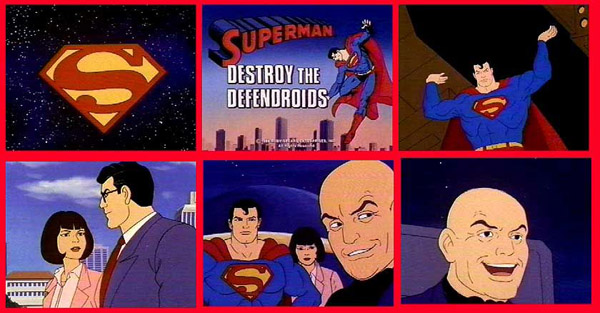
Joe Ruby stated, “As a kid, we all grew up with Superman. He’s the favorite, always. Your heroes stick with you. So we wanted to make the best Superman show we could, to really set it apart. I think everyone that worked on it felt that way. He’s Superman.”
Ken Spears said, “It was like an honor to do something that classy and classic as Superman. He’s the No. 1 guy. We wanted to do it justice.”
All the episodes were released on a DVD collection in 2009 including a bonus twelve minute feature “Corporation of the Corrupt: The Rise of Lexcorp,” tracing the evolution of Luthor’s character from the fear-of-science ’40s and ’50s to the “greed is good” of the ’80s.
1. Destroy the Defendroids / The Adoption
2. Fugitive from Space / The Supermarket
3. By the Skin of the Dragon’s Teeth / At the Babysitter’s
4. Cybron Strikes / The First Day at School
5. The Big Scoop / Overnight with the Scouts
6. Triple-Play / The Circus
7. The Hunter / Little Runaway
8. Superman and Wonder Woman versus the Sorceress of Time / The Birthday Party
9. Bonechill / The Driver’s License
10. The Beast Beneath These Streets / First Date
11. Wildsharkk / To Play or Not To Play
12. Night of the Living Shadows / Graduation
13. The Last Time I Saw Earth / It’s Superman


 Jim Korkis is an internationally respected animation historian who in recent years has devoted his attention to the many worlds of Disney. He was a columnist for a variety of animation magazines. With his former writing partner, John Cawley, he authored several animation related books including The Encyclopedia of Cartoon Superstars, How to Create Animation, Cartoon Confidential and Get Animated’s Animation Art Buyer’s Guide. He taught animation classes at the Disney Institute in Florida as well as instructing classes on acting and animation history for Disney Feature Animation: Florida.
Jim Korkis is an internationally respected animation historian who in recent years has devoted his attention to the many worlds of Disney. He was a columnist for a variety of animation magazines. With his former writing partner, John Cawley, he authored several animation related books including The Encyclopedia of Cartoon Superstars, How to Create Animation, Cartoon Confidential and Get Animated’s Animation Art Buyer’s Guide. He taught animation classes at the Disney Institute in Florida as well as instructing classes on acting and animation history for Disney Feature Animation: Florida.
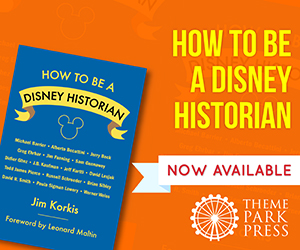



















































Is that Ted Knight doing the voiceover on the theme sequence? Sounds like him.
Ted Knight died in 1986, so no
It might be William Woodson, who could achieve that bombastic tone almost as skillfully as Ted Knight. It almost sounds like a homage to the great Knight, who did so much narration for the DC-related cartoons of the ’60s and ’70s. Ted Knight passed away in 1986.
Patrick, it is most decidedly Bill Woodson, who worked with superheroes previously in the sketch “The Flackman and Reagan” on a Stan Freberg album.
He’s sounding a lot older than I’m used to, but after checking I see he was about 71 when he did the tracking here.
This came out during a period when I had less time for television, especially in the mornings or on the weekends. I remember catching only a couple of episodes, but being fairly impressed with what I saw. Now that I know of the DVD collection, I might have to pick that up sometime soon to revisit it, especially given the writing talent behind the series.
Just checked, even IMDB doesn’t have a credit for the narrator
Superman 88 seems like the kind of show that should’ve been a hit, but just didn’t. From what I can gather, the show didn’t really do anything wrong, creatively nor market-wise, at least that other similar shows weren’t already doing. The show’s failure was, in my eyes, mainly a result of awkward scheduling. Not only was the show’s 8:30 ET time slot too early considering the audience that would’ve appreciated it the most was probably sleeping in, it was the time where bears were active – Disney bears to be exact. Gummi Bears was already an established hit on NBC, and ABC got a new weapon in the form of Winnie the Pooh, which they’d spent the better part of the summer hyping to hell and back. Rather than breathing new life into the Man of Steel on Saturday mornings, CBS instead found themselves watching helplessly as Mickey Mouse hit Supes with a Kryptonite ray. But hey, the 1988 season wasn’t all that bad for them – after all, that same year saw them strike gold with Garfield and Friends, which would run for an outstanding seven seasons.
Another strength of the Ruby-Spears “Superman” was its dramatic musical score by Ron Jones, who also composed music for “Duck Tales”, “American Dad!” and “Family Guy”, as well as live-action shows such as “The A-Team” and “Magnum, P.I.”. Jones was infamously fired from “Star Trek: The Next Generation” in its fourth season by executive producer Rick Berman, who felt that Jones’s music was too “noticeable”. Reminds me of Baron van Swieten’s assessment of Mozart’s opera “The Marriage of Figaro”: “The ear can’t hear that many notes!”
Jones’s serious music for the series contrasts markedly with the more cartoony style of Haim Saban and Shuki Levy, who score other Ruby-Spears cartoons around this time.
That is definitely William Woodson, who also replaced Ted Knight on Superfriends. His most well-known narration is for the opening titles of classic TV series “The Odd Couple.”
Ron Jones also composed for Hanna-Barbera when Hoyt Curtin was musical director. Many young composers got their start there.